No matter how you look at it, China stocks are a money loser for investors these days. How bad is it? Below are some charts showing the performance of Shanghai, Shenzhen, Hong Kong, and U.S. listed shares of Chinese companies compared to U.S. rivals, and benchmark indexes like the S&P 500.
As some in the Senate now consider removing China stocks from the Thrift Savings Plan (TSP), a roughly $720 million pension system serving some 6.5 million civil servant employees and the military, geopolitical risk and a soft decoupling has turned a must-have investment into a questionable one. Investors are losing money in China.
In 2022, the Federal Retirement Thrift Investment Board said that China investments were “unfitting” for TSP. “We agree it is unfitting for Americans to invest in companies from China or elsewhere that undermine U.S. national security,” the Board wrote in a letter obtained by Fox Business News at the time. That letter was addressed to Republican Sens. Marco Rubio of Florida, Tom Cotton of Arkansas, and Tommy Tuberville of Alabama who have taken a lead in removing China from TSP. Last week, the House rejected an amendment to the National Defense Authorization Act that would have removed China from federal retirement plans. As it is, federal employee pension fund managers are not preserving their clients’ wealth by investing in China.
* * *
American investors of all sizes and risk profiles can invest in China. Not only can they invest in Chinese companies listed on the NYSE and Nasdaq, but they can now invest in companies listed in mainland China, along with Hong Kong, which has been open for years. One way to invest in these stocks is through exchange-traded funds (ETF) and mutual funds.
Here is one look at a popular ETF known in the market by its nickname “Asher”, which is a play off of its ticker symbol ASHR. This fund, run by DWS Group, a German asset manager, follows the CSI-300 Index, an index of Shanghai and Shenzhen listed companies earning in renminbi. Here is how it does compared to investments in the U.S., and investments in the iShares MSCI Emerging Markets ex-China ETF. It’s not a pretty picture for China’s A-shares.
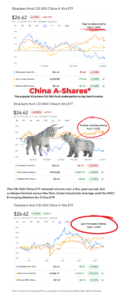
The H-Shares, which are listings on the Hong Kong Stock Exchange, have not done any better. Many on Wall Street like to say that it is their fiduciary responsibility to be invested in China because it is the world’s No. 2 economy.
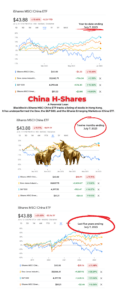
Savvy investors who picked brand name China stocks also lost money.
Here is Alibaba, the Chinese Amazon.
The stock trades on the NYSE, but year-to-date, one year, and in a five-year time frame, American fund managers would have done much better for their clients had they just invested in Amazon.
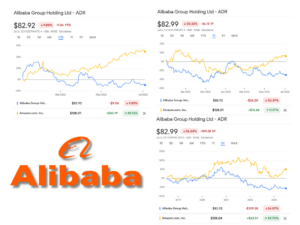
China is the world’s leading producer of solar. It dominates the entire supply chain. With the U.S. touting solar power and providing incentives to companies that manufacture in the U.S., one would think that China’s solar giant Jinko Solar, which has factories in Florida and trades on the NYSE, would be a good investment.
Here is Jinko compared to Ohio-based First Solar, the only American solar manufacturer listed on the stock exchange.
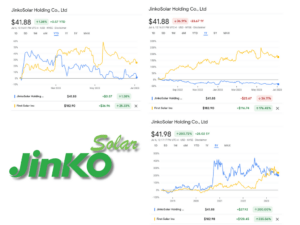
Over a longer period, Jinko investors have done well, up 200%. First Solar did even better for investors.
The term “opportunity cost” refers to the imaginary price one pays for not being in a market. The idea is that investors paid a price to sit on the sidelines, and lost an opportunity. There was an opportunity cost associated with avoiding JinkoSolar, which faces tariffs on its products. Still, investors would not have paid a huge price for choosing an American solar company to invest in instead.
Lastly, here is Geely Automotive. Geely shares trade over-the-counter and are not listed on the NYSE or Nasdaq but are open to American investors for a fee. For sure, any large China mutual fund holds Geely. Geely is one of China’s leading automakers. They are a major owner of the Volvo brand now. And they have a Tesla-like EV sedan, called the Polestar, which launched last year.
Here is how Geely stocks compared, in dollar terms, with General Motors, Ford, Toyota and Polestar rival Tesla.
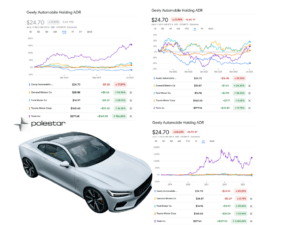
There is a need for transparency and investor information on China stocks that are mostly traded in Shanghai and Shenzhen, like Geely. Those mainland listed companies are not subject to the same financial audits as their American counterparts, let alone held to the same standards as other emerging market securities. Many of these investments are dubious. The financial press is full of stories of Chinese start-ups that did an IPO on a U.S. exchange, only to see its stock price crash to a point where it is no longer allowed on the NYSE, or they delist years later due to political and other pressures.
Today, investments in China come with a heightened geopolitical risk, including the risk of capital market sanctions. The first step is for individual and institutional investors to be aware of these risks, which differ today from other emerging markets, and be able to opt out of these companies and the investment funds that hold them.
Government Pension Fund Managers Invested In China Fail To Preserve Retirement Savings
No matter how you look at it, China stocks are a money loser for investors these days. How bad is it? Below are some charts showing the performance of Shanghai, Shenzhen, Hong Kong, and U.S. listed shares of Chinese companies compared to U.S. rivals, and benchmark indexes like the S&P 500.
As some in the Senate now consider removing China stocks from the Thrift Savings Plan (TSP), a roughly $720 million pension system serving some 6.5 million civil servant employees and the military, geopolitical risk and a soft decoupling has turned a must-have investment into a questionable one. Investors are losing money in China.
In 2022, the Federal Retirement Thrift Investment Board said that China investments were “unfitting” for TSP. “We agree it is unfitting for Americans to invest in companies from China or elsewhere that undermine U.S. national security,” the Board wrote in a letter obtained by Fox Business News at the time. That letter was addressed to Republican Sens. Marco Rubio of Florida, Tom Cotton of Arkansas, and Tommy Tuberville of Alabama who have taken a lead in removing China from TSP. Last week, the House rejected an amendment to the National Defense Authorization Act that would have removed China from federal retirement plans. As it is, federal employee pension fund managers are not preserving their clients’ wealth by investing in China.
* * *
American investors of all sizes and risk profiles can invest in China. Not only can they invest in Chinese companies listed on the NYSE and Nasdaq, but they can now invest in companies listed in mainland China, along with Hong Kong, which has been open for years. One way to invest in these stocks is through exchange-traded funds (ETF) and mutual funds.
Here is one look at a popular ETF known in the market by its nickname “Asher”, which is a play off of its ticker symbol ASHR. This fund, run by DWS Group, a German asset manager, follows the CSI-300 Index, an index of Shanghai and Shenzhen listed companies earning in renminbi. Here is how it does compared to investments in the U.S., and investments in the iShares MSCI Emerging Markets ex-China ETF. It’s not a pretty picture for China’s A-shares.
The H-Shares, which are listings on the Hong Kong Stock Exchange, have not done any better. Many on Wall Street like to say that it is their fiduciary responsibility to be invested in China because it is the world’s No. 2 economy.
Savvy investors who picked brand name China stocks also lost money.
Here is Alibaba, the Chinese Amazon.
The stock trades on the NYSE, but year-to-date, one year, and in a five-year time frame, American fund managers would have done much better for their clients had they just invested in Amazon.
China is the world’s leading producer of solar. It dominates the entire supply chain. With the U.S. touting solar power and providing incentives to companies that manufacture in the U.S., one would think that China’s solar giant Jinko Solar, which has factories in Florida and trades on the NYSE, would be a good investment.
Here is Jinko compared to Ohio-based First Solar, the only American solar manufacturer listed on the stock exchange.
Over a longer period, Jinko investors have done well, up 200%. First Solar did even better for investors.
The term “opportunity cost” refers to the imaginary price one pays for not being in a market. The idea is that investors paid a price to sit on the sidelines, and lost an opportunity. There was an opportunity cost associated with avoiding JinkoSolar, which faces tariffs on its products. Still, investors would not have paid a huge price for choosing an American solar company to invest in instead.
Lastly, here is Geely Automotive. Geely shares trade over-the-counter and are not listed on the NYSE or Nasdaq but are open to American investors for a fee. For sure, any large China mutual fund holds Geely. Geely is one of China’s leading automakers. They are a major owner of the Volvo brand now. And they have a Tesla-like EV sedan, called the Polestar, which launched last year.
Here is how Geely stocks compared, in dollar terms, with General Motors, Ford, Toyota and Polestar rival Tesla.
There is a need for transparency and investor information on China stocks that are mostly traded in Shanghai and Shenzhen, like Geely. Those mainland listed companies are not subject to the same financial audits as their American counterparts, let alone held to the same standards as other emerging market securities. Many of these investments are dubious. The financial press is full of stories of Chinese start-ups that did an IPO on a U.S. exchange, only to see its stock price crash to a point where it is no longer allowed on the NYSE, or they delist years later due to political and other pressures.
Today, investments in China come with a heightened geopolitical risk, including the risk of capital market sanctions. The first step is for individual and institutional investors to be aware of these risks, which differ today from other emerging markets, and be able to opt out of these companies and the investment funds that hold them.
MADE IN AMERICA.
CPA is the leading national, bipartisan organization exclusively representing domestic producers and workers across many industries and sectors of the U.S. economy.
TRENDING
CPA Sends Letter To Senate Leaders Schumer and McConnell Opposing Advancement of Recent USITC Nominations
CPA: Liberty Steel Closures Highlight Urgent Need to Address Mexico’s Violations and Steel Import Surge
CPA Applauds Chairman Jason Smith’s Reappointment to Lead House Ways and Means Committee
Senator Blackburn and Ossoff’s De Minimis Bill is Seriously Flawed
JQI Dips Due to Declining Wages in Several Sectors as November Jobs Total Bounces Back from Low October Level
The latest CPA news and updates, delivered every Friday.
WATCH: WE ARE CPA
Get the latest in CPA news, industry analysis, opinion, and updates from Team CPA.
CHECK OUT THE NEWSROOM ➔